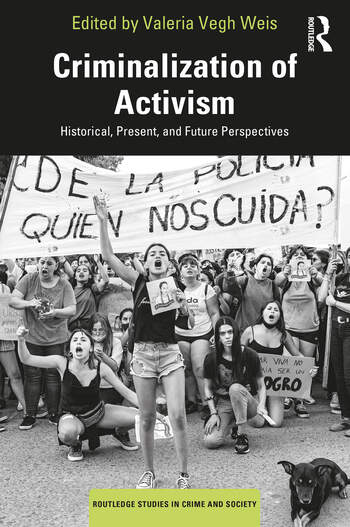Join SECP online and help us to celebrate the publication of Valeria Vegh Weis’s recent book.
13.00-14.00 (BST) Wednesday 23 February 2022 (Zoom)
PRESENTERS: Valeria Vegh Weis, Wayne Morison, Matt Clement, Roxana Cavalcanti.
Genocidal activism and the language of criminality: reflections on the duality of the Nazi-era and the avoidance of engagement with histories of social and political activism at the Nuremberg trials – Wayne Morrison
Avoiding and amplifying the criminal label in the Roman republic and medieval England – Matt Clement
An Analysis of the criminalisation of socio-environmental activism in contemporary Latin America – Roxana Cavalcanti
As critical scholars, we hardly get used to the never-ending cases of criminalization of protest and, more cruelly, to the police killings of those who dare to dissent. In Argentina, my home country, the extension of the phenomenon is so normalized that it has its own name: gatillo fácil (easy trigger). According to the grassroot organization Coordinating Committee against Police and Institutional Repression (Coordinadora contra la Represión Policial e Institucional, CORREPI) more than 7500 people were victims of the gatillo fácil from 1983 to 2020. Most of them were young, men and poor. Even when more progressive governments are in power, as it is the case today, undermining the functioning of a law enforcement agency ready to over-criminalize and even exterminate bottom-up dissent.
This is not the only problematic aspect. The cover of the book sheds light on another striking phenomenon: the fact that the police does not only over-criminalize dissent when marginalized voices dare to protest, but it is also never there when the impoverished communities require protection. The image deploys the friends of Ursula, who was 18 years old when she was murdered by her former partner, a policeman, whom she unsuccessfully denounced for gender-based violence and death threats more than 10 times. The image shows Ursula’s friends protesting with rage under a banner that painfully claims: “who protects us from the police?”
Unfortunately, Argentina is hardly an exception. The criminalization of dissent and the criminal selectivity that features the functioning of the criminal justice system are a worldwide phenomenon. Understanding that it is necessary to research and expose this massive violence that comes from the state, the same agency that is supposed to protect us, the book Criminalization of Activism draws on a multiplicity of perspectives and case studies from the Global South and the Global North to show how protest has been subject to processes of criminalization over time.
Contributors include scholars and activists from different disciplinary backgrounds, with a balance between authors from the Global North and the Global South. My introduction frames the topic within critical criminology, while also highlighting the possible disciplinary approaches and definitions of criminalization of resistance/activism. Meanwhile, I also investigate the particularities of the current times in comparison to dynamics of criminalization in prior stages of capitalism. Bringing together a range of criminalization themes into a single volume, compromising historical criminology, Indigenous studies, gender studies, critical criminology, southern criminology and green criminology, it will be of great interest to scholars and students of criminology, social movement theory and social sciences, as well as those involved in activism and with a stand against criminalization.
Profile of the author: https://uni-konstanz.academia.edu/ValeriaVeghWeis



Leave a Reply